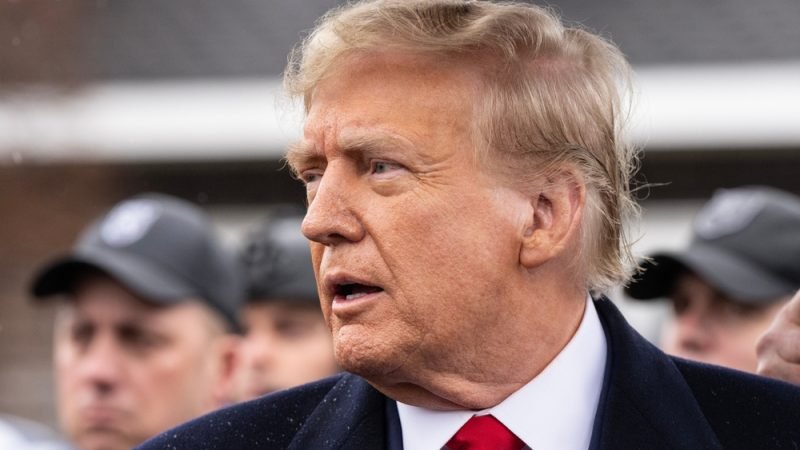A Donald Trump second term in the White House could severely fragment the global economic order and potentially trigger an economically disastrous trade war between the US and the EU, warn analysts.
Trump, who is locked in a tight electoral race with Democratic nominee and current Vice President Kamala Harris, has pledged to introduce tariffs of at least 60% on Chinese goods and 10% duties on imports from the rest of the world if re-elected as US president.
Such proposals raise fears that a second Trump term could be even more protectionist than his first – when he introduced tariffs on a range of goods including washing machines, solar panels, aluminium, and steel.
“Trump stands for radical ‘America First’ policies, and cares rather little about having an open transatlantic economic system,” Georg Riekeles, associate director at the European Policy Centre, told Euractiv.
“Under Trump, we are likely to see a trading and investment war on steroids.”
Riekeles added that Trump’s re-election would “entail and distribute huge losses of economic efficiency.”
“The green transition will become much more expensive, inflationary pressures could pick up again dramatically, and unemployment will rise as countries spiral towards protectionism,” he said.
Alicia García-Herrero, senior fellow at EU policy think-tank Bruegel, said that Trump’s choice of Ohio senator JD Vance as his running mate suggests that his protectionist stance is just as strong, or perhaps even stronger, than it was when he was president from 2017-2021.
A staunch critic of free trade, Vance has repeatedly emphasised the “need to protect American industries” from global competition through “broad-based tariffs, especially on goods coming in from China.”
“If we had any doubt as to whether Trump was going to be a different Trump, a more appealing Trump for Europe, for whatever reason, I think by now we know,” García-Herrero told Euractiv.
García-Herrero noted that EU leaders would likely attempt to offset Trump and Vance’s isolationism by engaging in “frantic action” to forge deeper economic and research partnerships with other “like-minded partners” including the UK, Canada, Australia, South Korea and Japan.
Riekeles, meanwhile, noted that Trump’s re-election in November would cause China “to compete even harder for other markets and for influence and power in the world.”
“It’s going to be a fight for all the BRICS: for Brazil, for India, for South Africa, and so on. And it’s going to be a fight for the resource-rich countries and for the Global South,” he said.
“I think the world could divide much faster than we anticipate,” he added.
US-EU trade war risk ‘asymmetric’
Analysts pointed to at least two key ways in which Trump’s proposed tariffs could directly impact the European economy.
The first, they explained, is that the 60% tariff on Chinese imports could lead to many goods originally intended for the US market being redirected and “dumped” on Europe, thereby forcing Europe to enact protectionist measures of its own.
“I think industry after industry in Europe will run to national capitals and Brussels, saying: ‘You have to save us – with subsidies and trade protection,’” Riekeles said.
From that standpoint, the European Commission’s recent decision to introduce tariffs on China-made electric vehicles only represents a precursor to what lies ahead, he said.
Sander Tordoir, chief economist at the Centre for European Reform (CER), noted that Trump’s 10% tariff on global goods would especially affect Germany, the bloc’s largest economy, which is already reeling from a combination of weak demand and growing competition from China.
“10% is not a massive tariff, but it will definitely hurt German exports, in an era in which they’re already struggling,” he said.
Tordoir explained that, with the US having recently surpassed China as Germany’s top trading partner and with the EU as a whole currently running a trade surplus of more than €150 billion with the US, the risks of a US-EU trade war are “asymmetric”.
He also noted that US protectionism would only compound Germany’s difficulties in finding suitable export markets, given China’s increasing tendency to impede foreign firms’ access to its own economy.
“I would be very worried about that if I were running economic policy in Berlin, because it is really not that obvious where you can sell German capital goods, if the two largest economies of the world are no longer providing that kind of market access,” he added.
Playing on the US’s security leadership
Some analysts also noted that Trump could attempt to weaponise the US’s status as Europe’s security guarantor to influence the continent’s trade policy.
Tobias Gehrke, senior policy fellow at the European Council on Foreign Relations (ECFR), told Euractiv that Trump might be more inclined to use ‘sticks’ rather than ‘carrots’ to encourage European firms to reduce their dependency on China.
“Right now the US gives a lot of incentives for companies to behave a certain way, particularly in the Inflation Reduction Act, which basically says: ‘You cut out China, but in return you get money,’” he said, referring to the US initiative that provides more than a trillion dollars in tax credits and subsidies to encourage domestic green manufacturing.
“That’s a pretty costly agenda. I think you could very well imagine that a Republican administration could turn it around and just say: ‘You’ll get access restrictions to the US market unless you behave in a certain way and change your supply chain.’”
Trump’s policies could also boost Chinese efforts to “drive a wedge between” the EU and US relationship, Gehrke said, by encouraging Europe to seek greater economic cooperation with Beijing rather than Washington.
However, he noted that the EU’s security reliance on the US would likely be too strong for Beijing to successfully pull Europe away from Washington’s orbit.
“The dependence on US security guarantees and support over Ukraine are just too evident to everyone. And the risk of that being jeopardised is, I think, going to keep Europe economically aligned with the United States,” he said.
An inevitable world decoupling?
Many analysts also noted that the growing rivalry between the US and China means that Europe’s economic and trade policy will likely need to undergo major changes regardless of who wins the presidential elections in November.
“We’re going to have to find other ways to do things without the US or with less of the US,” said Bruegel’s García-Herrero.
“This is true even if Harris wins the elections, because this is all about China – and the rest of the world is going to pay the price of the US moving [away] from open access.”
Riekeles of the EPC similarly noted that the “overall direction of the world” would be the same under a Trump or Harris presidency – namely, towards greater geopolitical and economic fragmentation.
“We’re in a different era today. It is no longer about markets and prices: it’s about security and the strategic competition between the US and China. And this is going to drive the world’s decoupling much faster than we think.”
[Edited by Anna Brunetti/Rajnish Singh]






